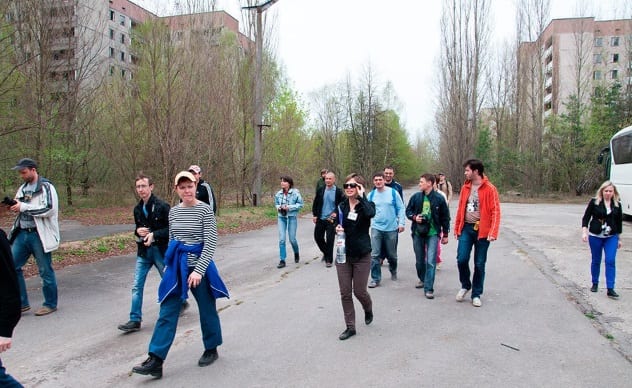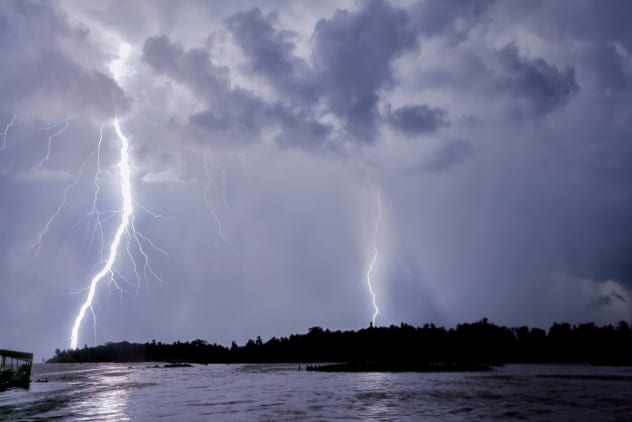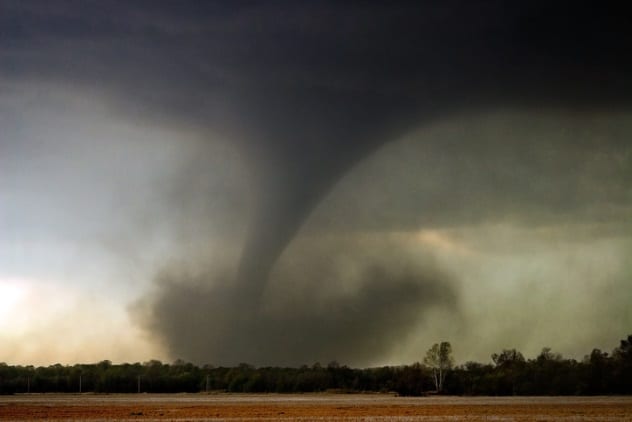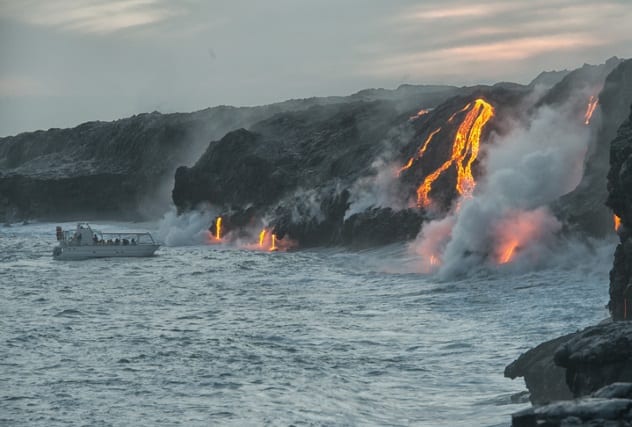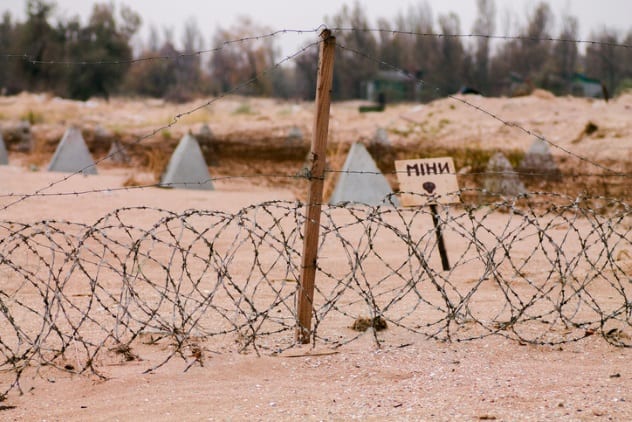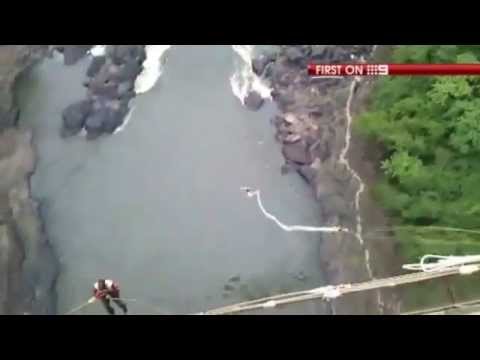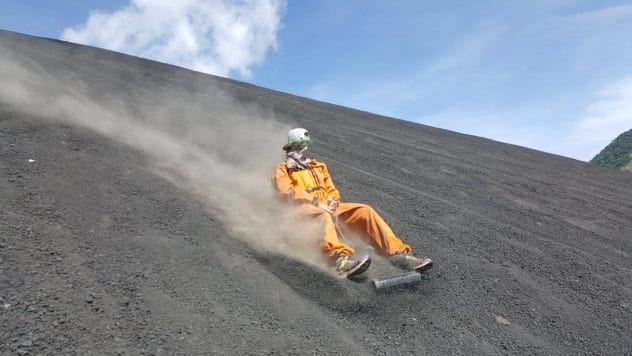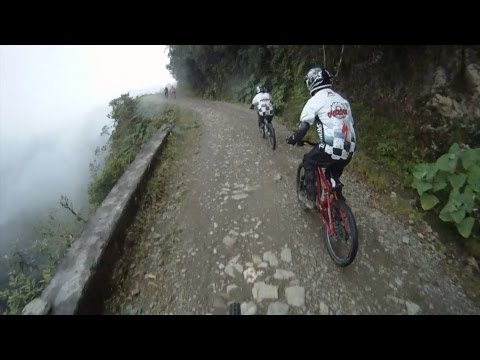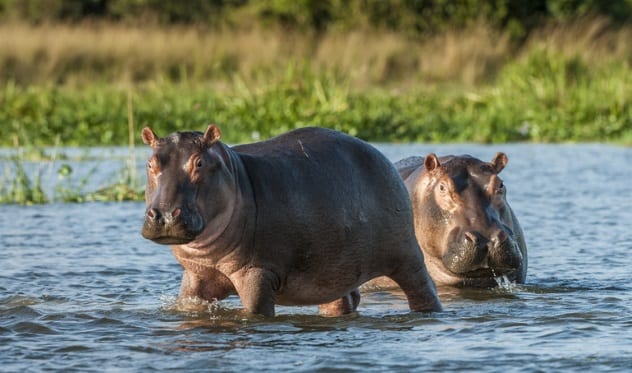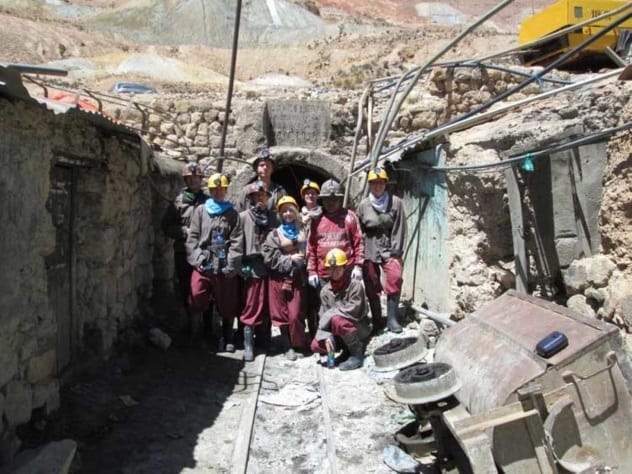There are so many insane tour companies offering very unique experiences, from chasing tornadoes in the United States to mining with dynamite in a mountain that has claimed a countless number of lives throughout history. All the tours featured in this list are extremely dangerous. Fortunately, many of them haven’t had fatal accidents; however, the risk of such an incident is very real in every case. Here are ten insane tours that are extremely dangerous.
10 Chernobyl Exclusion Zone Tours
One of the largest and most iconic nuclear disasters happened at the Chernobyl Nuclear Power Plant, located in Northern Ukraine, on April 26, 1986. Today, the Chernobyl Exclusion Zone is a great place for tourists to get a taste of a post-apocalyptic world experience. However, the area has not been deemed safe, and it is unclear how long the Zone will continue to be dangerous. Over the years, levels of radiation have diminished enough for the Ukrainian government to allow guided tours. There are many prohibited activities, however, including smoking, eating, or drinking in the open air as well touching buildings, plants, and trees. Attire is restricted to clothing that covers as much skin as possible when touring. The website of a business called Chernobyl Tours claims that the level of radiation tourists are exposed to is relatively small, less than we experience when flying. The guided tours avoid areas where radiation is in high concentration, and there is a low chance of tourists inhaling contaminated air in dangerous amounts, resulting in radiation sickness.[1] Although the risk is low, it is not absent, and the possibility of coming into contact with a lethal amount of radiation is constantly present, especially when not following the safety precautions given by the tour guides.
9 Lightning Tours
Lightning is one of the most beautiful natural phenomena that Mother Nature has to offer. Every day, thousands of us marvel at the incredible light shows thunderstorms put on, captivated like a moth drawn to bright light. These light shows are nothing like what can be witnessed in Venezuela where the Catatumbo River meets Lake Maracaibo, a mysterious place known as the unofficial lightning capital of the world and home to the “everlasting storm.” Here, magnificent tours are available that take tourists on sightseeing trips to local villages, night safaris to see alligators, snakes, and birds, a chance to see some dolphins, and, of course, the main event—lightning! It’s easy to get caught up in the excitement of witnessing something special and forget the dangers that accompany such an experience. Lightning has been known to strike from miles away, and this tour takes you right into the heart of the all the action; the town of Maracaibo can receive more than 1,000 lightning strikes an hour. However, lightning is not the only weather phenomenon that Maracaibo residents are familiar with, as hurricanes and tornadoes are known to occur as well.[2] Tornadoes are born from thunderstorms, and with 260 stormy days a year, the chance of one forming increases dramatically. The storms are volatile and can shift direction in less than a minute. This tour is certainly as dangerous as it is beautiful.
8 Tornado Tours
With growing popularity due to the Discovery Channel’s Storm Chasers, tornado tours have become a booming business. Every year, extreme weather enthusiasts flock to America’s Tornado Alley in hopes of pursuing their dreams of witnessing one of Mother Nature’s most destructive works of art. Tornado Alley is an area in the center of the United States, named for the frequency of tornadoes due to dry air from both Canada and the Mexican Plateau colliding with moist air from the Gulf of Mexico to make favorable conditions for the development of supercell thunderstorms and tornadoes. Tornado tours are designed to take paying passengers on the ride of a lifetime, but this doesn’t come without a severe risk to safety. Due to the growing demand for these kinds of tours, more than a dozen companies have emerged in the last 20 years, adding to the amount of vehicles on the road, increasing congestion and putting passengers and storm chasers in very dangerous situations that worry both safety experts and law enforcement. The tour companies have a strong emphasis on safety, but even the most experienced professionals can find themselves in life-threatening situations, such as with the case of three chasers in Oklahoma during a storm in 2013 and three more in Texas during a 2017 storm.[3] There is no safety when tornadoes can change direction without warning. Lightning and golf ball-sized hail are also a major safety concern during severe weather. As the saying goes: When thunder roars, go indoors.
7 Lava Boat Tours
Watching lava flow is a satisfying sight to see, and the ability to see it flowing into the sea up close would catch anyone’s attention. In Hawaii, there are lava boat tours that take you close enough to hear and feel the heat of the lava as it pours into the water and cools. This tour sounds absolutely fascinating but also comes with its own risks that not everyone may be aware of. It’s obvious that lava is dangerous, and it’s silly to be within a close distance of the melting destruction it brings. Being aboard a boat when things go wrong is not the ideal scenario, and incidents have happened in the past. In July 2018, an explosion sent molten rock raining down on a boat, injuring 23 tourists as it melted its way through the roof of the vessel. Despite the disastrous turn of events, the tour company has continued their tours while sticking to the revised policy of the Coast Guard.[4]
6 War Zone Tours
War zone tours take thrill-seekers to a whole new battlefield of excitement with life-threatening sightseeing expeditions through destinations that are or were once war zones and extremely dangerous. Tourists are able to witness firsthand the effects of war, including live action and explosions in some places. With tours taking place in many different areas, including Iraq, Mexico, and Africa, there are many opportunities for extreme thrill-seekers to experience a dangerous adventure. A company appropriately called War Zone Tours (WZT) has conducted excursions in over 50 different countries since they were founded in 1993.[5] All the tours are developed and planned specifically for your desired experience and are led by high-risk environment guides who are highly trained security professionals, according to WZT’s website. However, this does little to help in the case of missiles, as with an incident in 2016 where eight tourists were nearly killed when their tour bus was hit by a rocket in Afghanistan. Most of these tours take place where travel is highly ill-advised.
5 Bungee Jumping Over Crocodile-Infested Waters
Bungee jumping is a very popular extreme sport, but it’s a whole different thing when you’re nose-diving 111 meters (364 ft) toward crocodile-infested waters with your feet bound tight. At the Victoria Falls Bridge between Zimbabwe and Zambia, this exact experience is offered, but not without taking a very dangerous risk. Accidents can happen at any time, even when safety precautions are in place. No one wants to pay for the leap of a lifetime, only to have the bungee cord snap on the way down. This is exactly what happened to Erin Langworthy, an Australian woman on vacation during New Year’s Eve 2011. Fortunately, she survived with minor injuries, despite having to swim with her feet tied together and having to free the cord at one point when it became caught on some rocks.[6] This thrilling jump is absolutely as terrifying as it is dangerous.
4 Volcano Boarding
Volcanoes are brilliant and scary, and the idea of boarding down the side of an active one is terrifying and dangerous in its own right. Now considered an extreme sport, volcano boarding was invented by an Australian thrill-seeker named Daryn Webb in 2004. Nicaragua’s Cerro Negro, Central America’s youngest volcano, last erupted in 1999 and is the world’s hot spot for this bizarre sport. This exciting adventure takes endurance; the-hour long hike through 32-degree-Celsius (90 °F) temperatures up the ash-covered side of the volcano and past sulfur-spitting craters serves as a reminder that this volcano could erupt at any time.[7] Once you reach the top and are equipped with a metal-reinforced wooden board with ropes to steer and an orange jumpsuit for protection, you’re all set for the ride of a lifetime. This young volcano has more than 20 eruptions under its belt since its birth in April 1850 and is considered the region’s most active volcano, featuring occasional lava flows and powerful explosions. Recently, as of October 2018, increased earthquake activity has been noted, which may only put thrill-seeking tourists at an even higher risk.
3 Death Road Tours
Bolivia’s Yungas Road, dubbed “Death Road,” is regarded as the most dangerous road in the world and has claimed numerous lives over the years. It is no surprise that it has become a hot stop for thrill-seeking tourists from all around the world for a mountain biking adventure and a “I survived my ride on the world’s most dangerous road” T-shirt.[8] Although the road has become safer over the years, it still holds its risk factors and is to be respected as a dangerous tour to go on. The high-elevation trip down 64 kilometers (40 mi) of mostly narrow road lacking guardrails, with the ever-present danger of passing cars and steep drops, is no bike ride through the park. Nevertheless, Death Road still serves as the mountain biking adventure of a lifetime for more than 25,000 thrill-seekers annually. It is very important to do research on the tour companies offering Death Road tours, as many are available, and they’re far from equal. It is also imperative that you are always comfortable with the bike you’re riding in such a dangerous place.
2 Kayaking With Hippos, Crocodiles, And Bull Sharks
Everybody wants to get close to wildlife, but kayaking with animals that can kill you is something many of us might not have on our bucket list. For the ultimate thrill-seekers, however, the opportunity to kayak with hippos, crocodiles, and even bull sharks exists in the St Lucia Estuary in South Africa and is described as a fantastic way to get up close and personal with nature. You are bound to encounter some breathtaking birds and man-eating predators. This not a tour for those who are seeking a calming experience with nature and can hardly be considered safe. The tour is not conducted in a controlled environment, and the guides aren’t hesitant to withhold information regarding the dangers of the area, including deaths that have occurred due to animal attacks. It is important to be very careful while on the tour, staying alert at all times and keeping body parts out of the water, so it’s surprising that tourists of all skill levels are permitted to kayak the potentially deadly waters of this estuary.[9] It is not an unknown occurrence to have a hippo surface right in front of one’s kayak.
1 Mining With Dynamite In Bolivia
This tour is one that is hard to believe exists and is the perfect opportunity to experience what life in the mines is actually like. It is as dangerous as it is unbelievable. Near Potosi, Bolivia, sits Cerro Rico (“Rich Mountain”). It has been dubbed “The Mountain that Eats Men” for good reason; Cerro Rico’s silver mine has claimed the lives of many people. With a shrine to the Devil located inside that the miners give offerings to for protection, this tour is definitely not for the faint of heart, or those who value safety in general. After everyone suits up in the provided safety equipment consisting of a hardhat, boots, and overalls, the multiple-hour tour begins with a trip to a miner’s market, where tourists are encouraged to purchase tobacco, alcohol, live dynamite, and other gifts to offer the workers they will encounter in the mine. At the entrance into the mine, the guide will list off a quick rundown of safety precautions, like not falling into holes, watching out for passing mine carts, and not lighting your dynamite, pretty self-explanatory stuff.[10] Then the tourists venture down into the tight, winding, dark tunnels. Conditions inside are less than favorable, dark, hot, and dusty, the very same unbearable conditions that African slaves and indigenous people were forced to withstand for weeks on end, with few lucky enough to return to the surface. Once the gift of dynamite is offered to the workers inside the mine, they will detonate it for the terrifying experience of watching the walls trembling and debris falling from the ceilings all around. In recent years, the condition of the silver mine has become increasingly unstable as the site continues to degrade due to uncontrolled mining operations conducted in the past. While the risk of a collapse is lowered as long as miners conduct their work above the 4,400-meter (14,400 ft) mark in the labyrinth of tunnels, and with some safety measures put in place, the summit persistently sinks by a few centimeters each year, making the mine’s tours among the most dangerous available.
